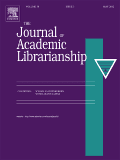
JOURNAL OF ACADEMIC LIBRARIANSHIP
Scope & Guideline
Elevating Scholarly Dialogue in Library Sciences.
Introduction
Aims and Scopes
- Information Literacy and Instructional Practices:
The journal emphasizes the importance of information literacy, exploring pedagogical approaches, instructional design, and the integration of technology in teaching practices within academic libraries. - Technological Integration and Innovation:
Research in this area focuses on the adoption of emerging technologies such as artificial intelligence, data analytics, and digital tools that enhance library services and user engagement. - Diversity, Equity, and Inclusion (DEI) Initiatives:
The journal highlights research on DEI initiatives in academic libraries, including studies on access, representation, and the impact of these initiatives on library services and community engagement. - Collaboration and Community Engagement:
There is a strong focus on collaboration within and outside academic libraries, exploring partnerships with faculty, students, and community organizations to enhance library services and outreach. - Research Support and Data Management:
The journal addresses the evolving role of academic libraries in supporting research activities, including research data management, open access publishing, and the integration of library services into the research process. - User Experience and Library Services:
Research on user experience seeks to understand patron needs and service effectiveness, focusing on enhancing library spaces, resources, and overall user satisfaction. - Ethics and Professional Development:
The journal also covers ethical considerations in librarianship and the professional development of library staff, addressing challenges and best practices in the field.
Trending and Emerging
- Artificial Intelligence and Automation:
There is a growing trend towards integrating AI technologies in academic libraries, with research focusing on the implications of AI for information literacy, research support, and library operations. - Mental Health and Well-being Initiatives:
Emerging studies emphasize the role of academic libraries in supporting mental health and well-being among students and staff, highlighting the need for libraries to adapt services to address these concerns. - Open Educational Resources (OER) and Accessibility:
Research on OER continues to grow, reflecting an increased focus on accessibility and affordability of educational materials, as well as the role of academic libraries in promoting and supporting OER initiatives. - Data Literacy and Research Data Services:
As data becomes integral to research processes, there's an increasing emphasis on data literacy and the provision of research data services, highlighting the library's role in supporting data management and sharing. - Collaboration with Other Academic Units:
There is a trend towards collaborative initiatives between libraries and other academic departments, fostering interdisciplinary partnerships that enhance the educational experience and library visibility. - Ethical Considerations in Librarianship:
Emerging research is increasingly addressing the ethical dimensions of librarianship, including topics such as privacy, intellectual freedom, and the ethical use of technology in library services.
Declining or Waning
- Traditional Reference Services:
As academic libraries increasingly integrate technology into their service models, traditional reference services, particularly in-person consultations, have seen a decline, with less emphasis on conventional methods of reference assistance. - Print Resources and Collections:
With the ongoing transition to digital resources, there is a noticeable decrease in research focused on print collections and traditional book lending practices within academic libraries. - Library Facility Design:
Research specifically dedicated to the physical design of library spaces has diminished as more emphasis is placed on technology integration and online services, reflecting a shift in how libraries are perceived and utilized. - Vendor Relationships and Licensing Issues:
Topics surrounding vendor negotiations and licensing agreements have become less prominent, possibly due to a greater focus on open access and self-archiving practices among academic institutions. - Library Anxiety and User Stress:
While still relevant, studies specifically addressing library anxiety and stress related to library use are appearing less frequently, possibly as libraries adapt to more user-friendly environments.
Similar Journals

LIBRARY JOURNAL
Connecting Knowledge with Community NeedsLIBRARY JOURNAL, published by REED BUSINESS INFORMATION, is a vital periodical in the field of Library and Information Sciences, providing a rich resource for researchers, professionals, and students alike. With a history spanning from 1945 to its recent issues, this journal captures the evolving landscape of library science, offering insightful articles that address current trends, practices, and challenges within the profession. Although not an open access journal, LIBRARY JOURNAL is highly regarded for its content, which reflects the challenges faced by libraries and the critical role they play in education and community services. Despite its Scopus ranking of 159 out of 210, the journal continues to contribute significantly to discussions around information management, bibliometrics, and digital libraries, making it an essential read for those invested in the ongoing development of library services and information literacy in the digital age.
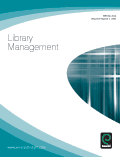
Library Management
Empowering Library Management Through Research and InnovationLibrary Management, published by Emerald Group Publishing Ltd, is an esteemed academic journal dedicated to the field of Library and Information Sciences. Since its inception in 1979, the journal has continued to be a vital resource for researchers, scholars, and practitioners interested in the evolving practices of library management, information organization, and the role of libraries in the digital age. With an impressive Q1 ranking in the Library and Information Sciences category and a strong performance in Scopus metrics (ranked #85 out of 280), Library Management offers innovative insights and evidence-based research that aim to enhance library services and management practices globally. As an essential contributor to the academic and professional landscape, the journal's objectives include promoting scholarly discourse, fostering best practices, and providing a platform for cutting-edge research that addresses current challenges and opportunities in library management. Researchers and professionals in the field can access a wealth of knowledge without open access barriers, ensuring that the latest findings are available to those dedicated to advancing the discipline.
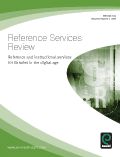
REFERENCE SERVICES REVIEW
Advancing knowledge in library and information sciences.REFERENCE SERVICES REVIEW, published by Emerald Group Publishing Ltd, is an esteemed journal in the field of Library and Information Sciences and E-learning. With a rich history dating back to 1973, this journal serves as a crucial platform for scholars, practitioners, and students to disseminate and engage with cutting-edge research in reference services and information management. Currently holding a prestigious Q1 ranking in Library and Information Sciences and Q2 in E-learning, it stands out in Scopus rankings as well, being positioned at #76 out of 280, placing it in the 73rd percentile. As a subscription-based journal, REFERENCE SERVICES REVIEW provides readers with robust, peer-reviewed articles that aim to enhance the quality and effectiveness of reference services. Whether you're researching current trends or seeking practical methodologies in library science, this journal is an invaluable resource for advancing knowledge and practice in the field.
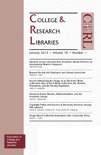
COLLEGE & RESEARCH LIBRARIES
Connecting Research with Practical Library SolutionsCOLLEGE & RESEARCH LIBRARIES, published by the Association of College & Research Libraries, stands as a pivotal platform in the field of Library and Information Sciences. With an impressive Q1 ranking and a Scopus rank of 78 out of 280, it sits in the 72nd percentile among its peers, reflecting its significant contribution to academic scholarship. The journal, in circulation since 1939 and with *Open Access* status since its inception, is committed to disseminating high-quality research and practical insights for librarians, information professionals, and researchers. Based in the heart of Chicago, the journal provides a comprehensive overview of trends, challenges, and innovations within the library and information sector. Covering a broad spectrum of topics with converged years reflecting a rich historical context (from 1946 to 1947 and from 1987 to 2024), it facilitates discourse among practitioners and scholars aiming to advance the effectiveness of library services. Whether you are a researcher seeking to explore new methodologies or a student striving to stay informed of the latest industry developments, COLLEGE & RESEARCH LIBRARIES is your essential resource.

Evidence Based Library and Information Practice
Transforming information services through empirical studies.Evidence Based Library and Information Practice is a premier open-access journal published by the University of Alberta, Canada, since 2006. With a firm commitment to advancing research in the Library and Information Sciences, this journal provides a platform for the dissemination of innovative practices and empirical studies that inform library and information services globally. Recognized in 2023 with a Q3 category rating within its field, it ranks 169 out of 280 in the Scopus database, reflecting its growing influence and relevance. The journal’s objective is to bridge the gap between theory and practical applications, making it an essential resource for librarians, scholars, and students who seek evidence-based insights to enhance library practices and information management. By facilitating open access to high-quality research, Evidence Based Library and Information Practice plays a crucial role in fostering an informed academic community.
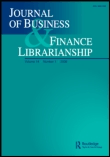
Journal of Business & Finance Librarianship
Unlocking Insights for Today's Information ProfessionalsJournal of Business & Finance Librarianship is a pivotal resource for those engaged in the multidisciplinary fields of library and information sciences, e-learning, and marketing management. Published by Routledge Journals, Taylor & Francis Ltd, this journal serves as an essential platform for scholars, librarians, and business professionals seeking to explore the intersection of finance and librarianship. Established in the early 1990s, it has evolved its scope to address contemporary challenges and innovations in business information management, particularly relevant in today's digital age. Despite not being an Open Access journal, its quality is evidenced by its robust standing, holding a Q2 rank in Library and Information Sciences in 2023. With an emphasis on providing empirical research and practical solutions, the Journal of Business & Finance Librarianship is an invaluable tool for advancing knowledge and expertise in the library profession and finance sectors.
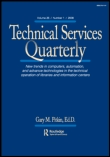
Technical Services Quarterly
Enhancing technical services through rigorous research and practice.Technical Services Quarterly, published by Routledge Journals, Taylor & Francis Ltd, is a critical platform for the dissemination of scholarly research in the fields of Library and Information Sciences as well as Computer Science Applications. With an established history dating back to 1984, this journal has fostered a vibrant academic community and continues to thrive with a robust publication strategy aimed at enhancing technical services in libraries. As a Q3-ranked journal in Computer Science Applications and Q2 in Library and Information Sciences for 2023, it provides a compelling opportunity for researchers and professionals to contribute to and engage with cutting-edge developments in these disciplines. While currently not an open-access journal, Technical Services Quarterly ensures that its content remains relevant and impactful by maintaining rigorous peer-review standards and a commitment to scholarly excellence. With a focus on practice-oriented research and empirical studies, it encourages contributions that further the understanding of evolving technologies and their applications within the library sector, making it an essential read for academics and practitioners alike.

Publications is a leading international journal published by MDPI, based in Switzerland, that has been at the forefront of scholarly communication since its inception in 2013. As an Open Access journal, it aims to disseminate high-quality research across multiple disciplines, notably in Business and International Management, Communication, Computer Science Applications, Library and Information Sciences, and Media Technology. Its impressive standing is reflected in its 2023 Scopus ranks, with top quartile positions across various fields, including a Q1 ranking in Library and Information Sciences and Media Technology. With a commitment to promoting innovation and collaboration, Publications serves as an essential platform for researchers, professionals, and students alike, allowing them to engage with the latest findings and discourse. The journal's strategic focus on accessibility ensures that knowledge is available to a global audience, fostering an environment conducive to academic and practical advancements. The E-ISSN 2304-6775 identifies its distinct digital presence, making it an invaluable resource for anyone passionate about cutting-edge research.
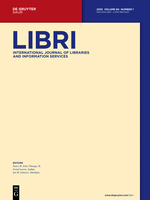
LIBRI-International Journal of Libraries and Information Studies
Elevating Academic Discourse in Library StudiesLIBRI - International Journal of Libraries and Information Studies, with ISSN 0024-2667 and E-ISSN 1865-8423, is a premier academic publication in the field of library and information science. Published by the esteemed Walter de Gruyter GmbH in Berlin, Germany, this journal has carved a distinguished place in academic discourse, earning a Q2 ranking in 2023 within its category, which underscores its impact and relevance to the community. With a comprehensive history spanning from 1950 and ongoing coverage until 2024, LIBRI provides a platform for rigorous research and innovative studies that advance the understanding of libraries and information systems globally. Researchers, professionals, and students are invited to engage with its diverse articles that cover a plethora of topics relevant to today’s information landscape. Although not an open-access journal, its contributions are valuable for those seeking to enhance their knowledge and stay updated in a rapidly evolving field.
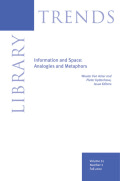
LIBRARY TRENDS
Innovating Practices for a Digital AgeLIBRARY TRENDS is a leading academic journal published by Johns Hopkins University Press, dedicated to the field of Library and Information Sciences. With an established history spanning from 1980 to 2023, this peer-reviewed journal provides a platform for insightful research, innovative practices, and critical analysis addressing contemporary issues in library science. While it holds a respectable Q3 quartile ranking within its category, it ranks #145 out of 280 in Scopus, indicating its significance in the academic community. With an impact factor that reflects the growing importance of the field, LIBRARY TRENDS invites contributions that encompass a wide range of topics, including digital libraries, information technology, and user studies. Although it is not an open-access journal, the content it provides is invaluable for researchers, professionals, and students seeking to enhance their understanding and improve their practices in the rapidly evolving landscape of library and information science. Discover more by exploring the latest issues and join the vibrant discourse shaping our information ecosystems.